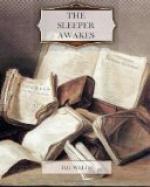“Are any of your great artists or authors here?”
“No authors. They are mostly such queer people—and so preoccupied about themselves. And they quarrel so dreadfully! They will fight, some of them, for precedence on staircases! Dreadful, isn’t it? But I think Wraysbury, the fashionable capillotomist, is here. From Capri.”
“Capillotomist,” said Graham. “Ah! I remember. An artist! Why not?”
“We have to cultivate him,” she said apologetically. “Our heads are in his hands.” She smiled.
Graham hesitated at the invited compliment, but his glance was expressive. “Have the arts grown with the rest of civilised things?” he said. “Who are your great painters?”
She looked at him doubtfully. Then laughed. “For a moment,” she said, “I thought you meant—” She laughed again. “You mean, of course, those good men you used to think so much of because they could cover great spaces of canvas with oil-colours? Great oblongs. And people used to put the things in gilt frames and hang them up in rows in their square rooms. We haven’t any. People grew tired of that sort of thing.”
“But what did you think I meant?”
She put a finger significantly on a cheek whose glow was above suspicion, and smiled and looked very arch and pretty and inviting. “And here,” and she indicated her eyelid.
Graham had an adventurous moment. Then a grotesque memory of a picture he had somewhere seen of Uncle Toby and the widow flashed across his mind. An archaic shame came upon him. He became acutely aware that he was visible to a great number of interested people. “I see,” he remarked inadequately. He turned awkwardly away from her fascinating facility. He looked about him to meet a number of eyes that immediately occupied themselves with other things. Possibly he coloured a little. “Who is that talking with the lady in saffron?” he asked, avoiding her eyes.
The person in question he learnt was one of the great organisers of the American theatres just fresh from a gigantic production at Mexico. His face reminded Graham of a bust of Caligula. Another striking looking man was the Black Labour Master. The phrase at the time made no deep impression, but afterwards it recurred;—the Black Labour Master? The little lady in no degree embarrassed, pointed out to him a charming little woman as one of the subsidiary wives of the Anglican Bishop of London. She added encomiums on the episcopal courage—hitherto there had been a rule of clerical monogamy—“neither a natural nor an expedient condition of things. Why should the natural development of the affections be dwarfed and restricted because a man is a priest?”
“And, bye the bye,” she added, “are you an Anglican?” Graham was on the verge of hesitating inquiries about the status of a “subsidiary wife,” apparently an euphemistic phrase, when Lincoln’s return broke off this very suggestive and interesting conversation. They crossed the aisle to where a tall man in crimson, and two charming persons in Burmese costume (as it seemed to him) awaited him diffidently. From their civilities he passed to other presentations.




